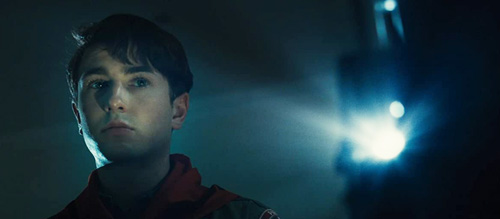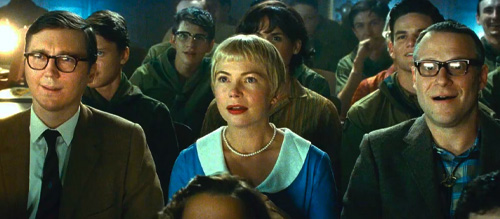The Fabelmans (2022) Review

The Fabelmans (2022)
Director: Steven Spielberg
Screenwriters: Steven Spielberg, Tony Kushner
Starring: Gabriel LaBelle, Mateo Zoryan, Michelle Williams, Paul Dano, Seth Rogen, Judd Hirsch, Keeley Karsten, Alina Brace, Julia Butters, Birdie Borria, Sam Rechner, Chloe East, Oakes Fegley
Steven Spielberg’s rich and diverse filmmaking oeuvre has been analysed and dissected so many times over the past six decades that his work has been described as everything from conspiratorial to all-American, New Era to glamourised Hollywood, but one thing that has always been an undeniable stylistic trait of his work is how earnest his presentations are, and how hopeful his films feel. In his latest picture, The Fabelmans, Spielberg has (by his own admission) made his most personal film to date: a semi-autobiographical tale of his adolescence focused upon his family life and how he found his passion for cinema. The characters may have a different family name, and the narrative may not be entirely true to life, but in turning the glow of his optimistic lens towards himself, this all-time great American filmmaker has dreamt up perhaps the most direct sermon of his illustrious career, proudly declaring through the rose-tinted spectacles of Americana-drenched nostalgia that art matters.
The Fabelmans isn’t a tale exclusively about the pursuit of artistic realisation, and vitally it strays away from the cliché narratives of typical struggling artist pieces. Instead, Spielberg’s self-reflective film focuses a lot of its energy on its core family dynamic, bringing Spielberg’s own art into the fore in key moments that emphasise the importance of art, of cinema particularly, to find truth, to offer hope, to be cathartic.
The majority of moments in this film are presented less like obvious character triumphs and are instead delivered with hushed reward for those paying attention. One particular moment, in which a character requests that Sam (the Steven Spielberg of the family, played by Gabriel LaBelle) puts together a film as a gift for another character, comes to mean a tremendous amount, the very act of putting together still frames referred to as “a hobby” or “not real” by naysayers within the text but proven to be nonetheless vital and moving and important. When we most need love, compassion, and empathy, art is there – that is the message.
Cinema functions within the world written by Spielberg and long-time writing partner Tony Kushner as being capable of spectacle and awe, of installing trust, emphasising love, and finding that inch of truth that exists somewhere between our observable world and our own consciousness. It’s placed as importantly as that – being the source of truth in one moment, the fabrication of reality the next, discovering something in someone that nobody else could see just moments after – and in being so well emphasised it becomes in some ways the most truthful of all of Spielberg’s work even beyond the autobiographical aspects of the narrative and each of its characters. This great filmmaker, whom so many aspire to be, has long defended the theatrical experience, the preservation of film libraries, the continuation of traditional methods and the embrace of new ones; and of all the messages to be gleaned from The Fabelmans, it is apropos that cinema in all of its forms and all of its applications is shown to be so tremendously important to the human spirit, that cinema is worth thinking about as being more than simple entertainment.

To the Spielberg superfan and those with a deep knowledge and appreciation for the history of American cinema, The Fabelmans isn’t filled with the in-your-face massive story beats of Hollywood’s great chronicles and is therefore not the all-out “cinema is our saviour” movie that Spielberg’s previous work may suggest, even with so much narrative focus on the act of creating and the experience of watching cinema. Spielberg and Kushner have been vocal about the director seeking permission from his mother to make a movie about his youth, one his mother apparently declared she believed he had already been making for years, and evidence of that deep level of mutual respect is threaded throughout. The Fabelmans is about cinema, yes, but it is equally about family, more specifically an ode to the filmmaker’s mother. She is talented, quirky, beautiful and free, like Jessica Chastain’s character in The Tree of Life only more grounded than ethereal, though not without moments of apparent cinema magic. She’s played with an almost TransAtlanticism by Michelle Williams, seemingly with the intention to capture the wonderment Spielberg himself feels when remembering her. It’s a quite exceptional performance, one able to peer through the bravado and find something truthful and emotive, but she won’t be everyone’s cup of tea.
The same can be said of the film in a wider context.
The nostalgia of the piece, the soft colour palette and glowing lens, the romanticised slow-motion sequences, and some of the work from the in-film Spielberg’s camera, seem oddly at arm’s length from whatever truth this great filmmaker most holds dear. It’s a powerful piece, of that there is no doubt, but it can feel more like a professor using personal anecdotes to lecture upon the art and importance of cinema than any kind of transcendental experience guaranteed to be an audience-pleasing, perspective-shifting moment in time. Each character is viewed so sympathetically that when one is given comeuppance it feels odd and out of place, highlighting how the rest of the film seems reluctant to pursue the deepest questions about Spielberg’s relatives, to delve into the parts of himself that “autobiographical” may suggest. There are playful moments, self-depreciating in-jokes even, as well as honest self-evaluation, which make the tale endearing and Spielberg’s lifelong gift to each of us seem all the more important, but this is late-career Spielberg with his evidently lighter touch looking to massage meaning throughout his piece rather than get you off your seat with a train crash, the crack of a whip, or the stomp of a prehistoric creature. You likely won’t raise from your feet, clench the arms of your chair, or sit wide-eyed in awe. For better and for worse, this is deeply constructed Spielbergian cinema; “constructed” being the key word.
Beyond the credentials attributed to The Fabelmans by its awards season success and the compliments paid to it in this review, there’s a truth that ought to connect with everyone: “You do what your heart says you have to, ’cause you don’t owe anyone your life”. No matter who you are or what you love, there’s a lesson to be learned from watching The Fabelmans, there’s inspiration to be taken. Take the advice of one of the world’s most famous, most successful, and most respected filmmakers, and do what your heart says you have to. Nobody else has lived your experience, nobody else has your voice. Spielberg has shaped each of us, shaped cinema, shaped art, shaped our culture, through presenting stories his mother always felt were about himself and his family. You could too.
Score: 20/24

